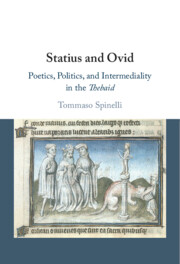
-
Select format
-
- Publisher:
- Cambridge University Press
- Publication date:
- March 2024
- May 2024
- ISBN:
- 9781009282208
- 9781009282215
- Dimensions:
- (229 x 152 mm)
- Weight & Pages:
- 0.58kg, 304 Pages
- Dimensions:
- Weight & Pages:
- Subjects:
- Classical Studies, Classical Literature
You may already have access via personal or institutional login- Subjects:
- Classical Studies, Classical Literature
Book description
This is the first in-depth exploration of the extent and significance of Ovidian intertexts in Statius' Thebaid, with particular emphasis on the interplay between poetics, politics, and material culture. Introducing New Historicist, Cultural Materialistic, and Intermedial approaches to Latin literature, it suggests that, despite their Virgilian patina, Statius' depictions of landscapes, heroes, and gods are pervaded by verbal and semantic allusions to Ovid's mythical narratives. This multi-layered allusivity not only prompts alternative readings of the Augustan classics, but also challenges the reader's perceptions of the Augustanising worldview that the urban landscape of Flavian Rome was arguably meant to convey. The poetic and political significance of Statius' Theban saga thereby moves from critically rewriting the Aeneid to reflecting on the new socio-political issues of Flavian Rome. This title is part of the Flip it Open Programme and may also be available Open Access. Check our website Cambridge Core for details.
Contents
Metrics
Full text views
Full text views help Loading metrics...
Loading metrics...
* Views captured on Cambridge Core between #date#. This data will be updated every 24 hours.
Usage data cannot currently be displayed.
Accessibility standard: Unknown
Why this information is here
This section outlines the accessibility features of this content - including support for screen readers, full keyboard navigation and high-contrast display options. This may not be relevant for you.
Accessibility Information
Accessibility compliance for the PDF of this book is currently unknown and may be updated in the future.


